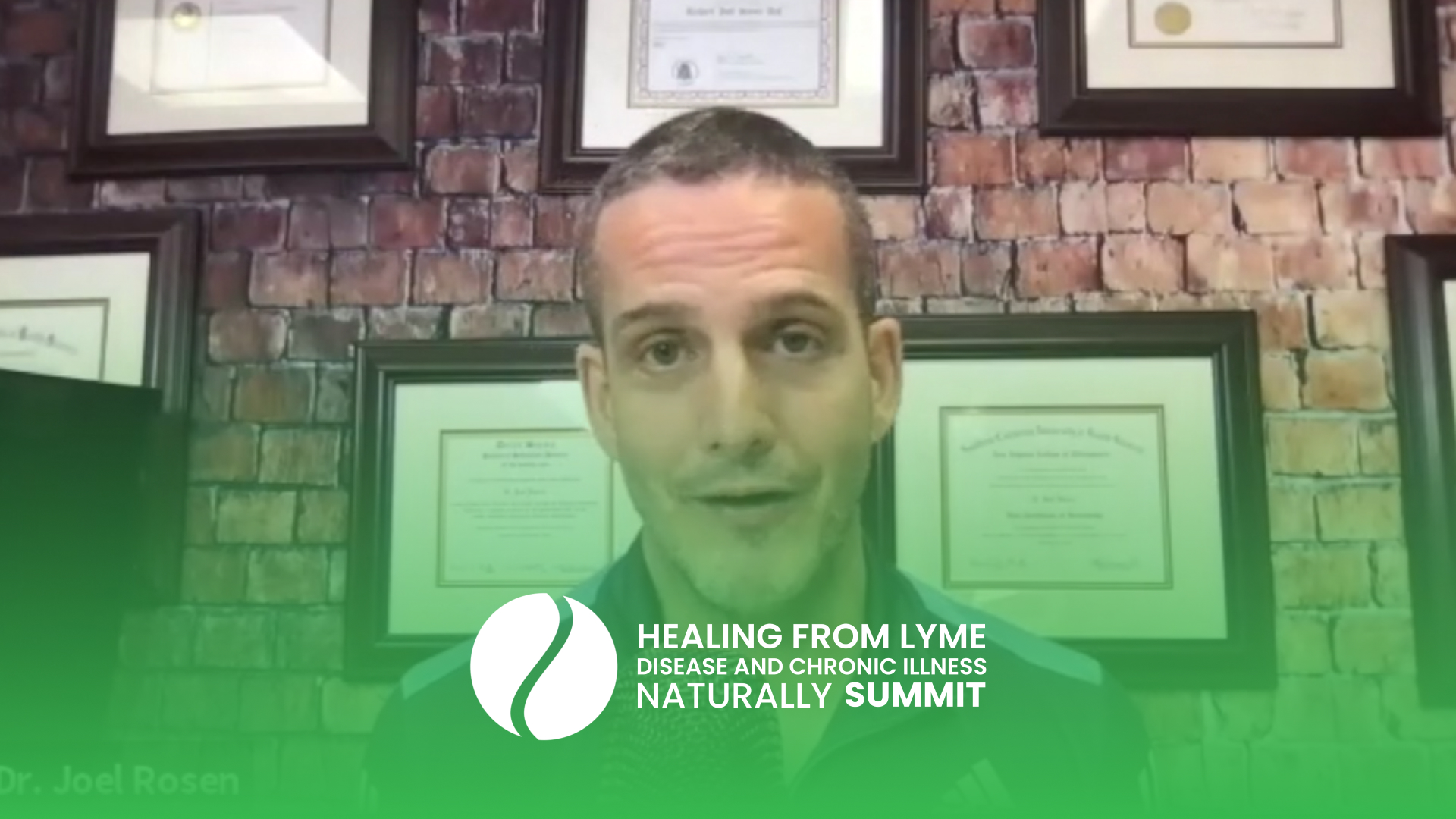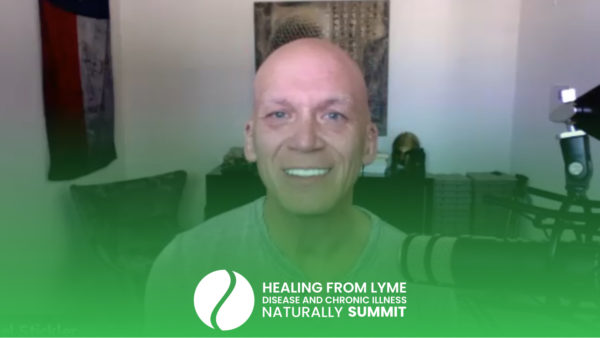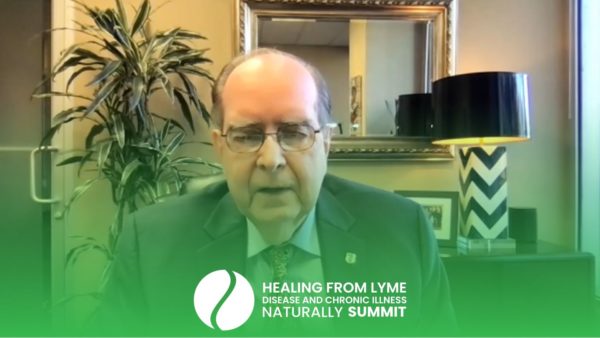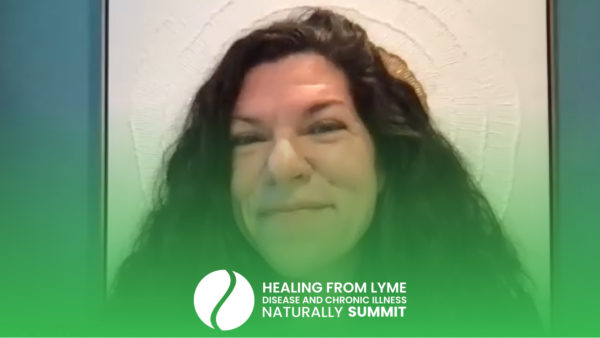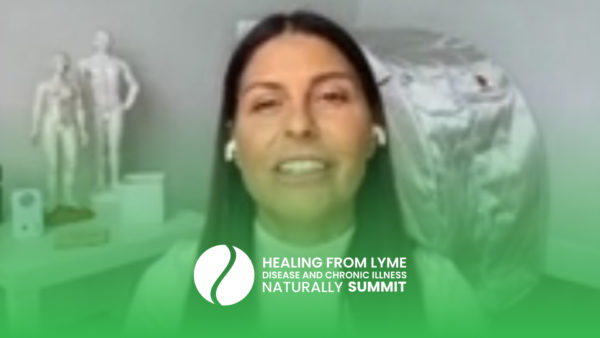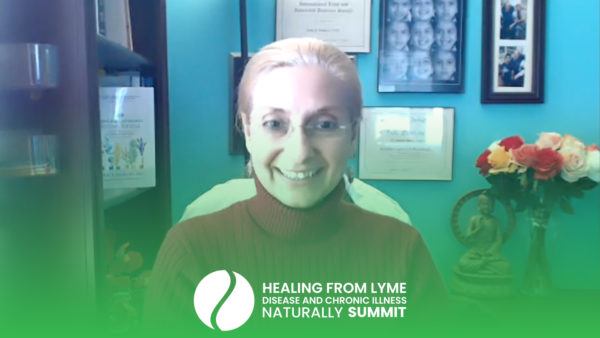Join the discussion below

Rob Besner, PSc.D, Co-Founder and Chief Science Officer of Therasage, has always been an advocate of natural health and wellness. Graduating from Boston University in Pre-Med, Engineering, Psychology and Business, he continued onto post graduate work at Case Western Medical School and Holistic Medicine After many years of illness, Mr.... Read More

Dr. Joel Rosen graduated from McMaster University with a degree in the Honours Bachelor of Kinesiology program. He also earned a second undergraduate degree in Psychology from York University in Ontario Canada, where he was born and raised for the first 28 years of his life. He went on to attend... Read More
- Adrenal Fatigue Stress and the demand for energy versus what you are able to produce.
- Ways to get back on track Minimize your stimuli.
Related Topics
Chronic IllnessRobby Besner PSc.D.
Hey everybody, it’s Robby Besner and we’re back with another episode of the healthy hotline. This is part of our Lyme series, we’re gonna be showcasing all of these amazing doctors and PhDs and people with bodies of work that are just incredible. They’re sharing their own experiences either clinically or personally with Lyme, how they got in touch with Lyme, how Lyme found them, either in their practice or in their personal health journey. Today, we have, I have a special dear friend. He’s a local, imagine that in Boca Raton, South Florida. And I wanna introduce Dr. Joel Rosen. He’s an amazing guy, we met a bunch of years ago at a clinic, he was in one of my little breakout groups. I’m looking at him and we kinda like had this little connection, and then I look at his name tag and it says, Boca Raton, where are you? We’re in the same town of, I think it was Chicago, we met somewhere like that. Meanwhile, Dr. Joel has been a great friend.
He is the adrenal ninja, and so all you Lyme is out there, you can’t get away from the stress that the environment has put on us. And no matter how you look at it, you’re symptomatic because you’re toxic. And because you’re toxic, it affects almost every single system in your body, but people kind of forget about how important the adrenal gland is in your systems in order to sort of maintain the integrity of your internal terrain and your internal chemistry. So I brought today a dear friend, a specialist, Dr. Joel Rosen, the adrenal ninja to give us the story about the adrenal piece and share with us some pearls that we hope will just elevate your awareness and make your day. So Dr. Joel, welcome to the healthy hotline.
Joel Rosen, D.C. CFMP
Well, thank you so much, Rob, Robby, that’s a great introduction, I appreciate being here and I hope that I can give a lot of value to the listeners today.
Robby Besner PSc.D.
No doubt. So give us a little backdrop, Joel, about like kind of, I just need a minute or two on maybe what you focus, I know you’re an integrated functional guy, I know that you are multidimensional and multi-disciplines, so you’ve done homeopathy, you do muscle testing, amazing different things. So give us a little bit of the backstory and then let’s just dive right in to the Lyme piece and share, we’ll unpack that. And we’ll just share with the audience and the viewers, just some of the hints and helpful suggestions you can make for our community.
Joel Rosen, D.C. CFMP
Sure, so like yourself and like I’ll all doctors that have a mission and a drive to help people that are exhausted and burnt out, they have their own story and I’m no different, I had my own story and it really culminated with being over $250,000 worth of student debt, and not being overwhelmed and stressed and having a wife that was pregnant with twins and injuring my back. So I found out this term called adrenal fatigue that I had no idea what it was, and I had studied, I had an exercise physiology degree, I had a psychology degree, I just graduated from chiropractic, and I never heard of adrenal fatigue, and so when I did the investigation, I found A, it’s a very controversial term.
Doctors don’t believe in it because quite frankly, the adrenals don’t fatigue per se, but they become dysregulated. And when I found out that doctors and it’s not believed, and a lot of the tests that you do don’t substantiate it, it became my mission and my purpose in life to help other people, ’cause I thought if I don’t know about this, how many other people must not know about this? And so now my goal is to tell the truth about adrenal fatigue and really the truth about it is that quite frankly, especially as it relates to Lyme, you quite simply have more demand for energy production in your body that you do supply at the end of the day.
And when you have a lot of stress, when we think about stress, psychological stress first comes to mind, but financial stress, emotional stress, chemical stress, EMF stress, pollutants, all of the above have to be processed. And ultimately, what happens is you’re not able to produce energy at the demand that you need to. So, as a result, not only your adrenals are what they now call your HPA axis, in terms of your brain signals to your adrenals, they become dysregulated, and then your body decides, okay, what are we gonna do with the limited amount of energy that we have? And so some of the things that are vital take back seat in that. So that could be being able to detox effectively or regulate your immune system or clear out excitatory neurotransmitters, or fill in the blank.
So, that’s kind of the backdrop of the journey I’ve been through from being exhausted and burnt out myself to learning about this thing called adrenal fatigue, to understand that ultimately it goes deeper even than the HPA axis and what I tell people, Robby, it’s the perfect storm. At the end of the day, if we wanna keep it easy, you have more demand than you do supply. And then also what happens is that your body is just unable to deal with that, and as a result, it creates that perfect storm of having the environmental triggers that impact your body. And then the genetic susceptibilities that don’t allow you to deal with those effectively, and Lyme would be that epigenetic environmental thing that would just throw everything off kilter. So, that’s kind of the introduction there.
Robby Besner PSc.D.
Well, great one. I love the fact that you saw it as an opportunity just through self-definition. And many times in the medical world, the Western medical world, when they can’t explain it they put a big, broad title on it and they call that, sometimes they call that a diagnosis, and it’s sort of catch-all stuff. You’ve got adrenal fatigue, what does that mean? And how does it affect everything else in self-regulation or body chemistry regulation? So, it’s just an important player, it’s a big seat at the table and people don’t quite get it. And then just the system tune-up for primal health, good primal health, a good foundational health. You need to have your adrenals in check. Now we’re living in a COVID world. People are very sympathetic dominant, their autonomic nervous systems, they’re stressed out, so they’re kind of, anxious, they’re at the edge of their seats, they’re confined maybe because of the social situation right now with COVID and all that.
But even aside from that, and I think you know that we developed a heart rate variability program and there’s actually a screen on that program that measures power in and power out. And when I did my HRV, even though my scans were really great and my biological age is like 20 years younger than what my physical age is, my adrenals, like I’m on burnout mode on, I have like 100 power in and I have 98 power out. So, I’m actually putting more energy in and getting less efficient use of my energy out. So, I think this is amazing category most of the people that’s viewing today are gonna be able to appreciate it. Some of them don’t get enough sleep because their circadian rhythms are off. Some get an enormous amount of sleep, but it’s not a deep REM restorative sleep. So, they wake up tired regardless, they’re not properly regulating. So give us some ways to get on track. What are the things that you think would be really important for people to know, even from a foundational starting point, nutrition? Just kind of guide us along that road, if you would.
Joel Rosen, D.C. CFMP
Sure, and less is more Robby. And so, first thing I would say is you said circadian rhythm, circadian rhythm is basically the sleep-wake cycle. And when the sun rises, our cortisol rises. And when the sun set our cortisol sets. So our stress hormone is on a circadian rhythm, and most people will identify, well, my, I don’t know what it’s called, but I have no energy in the morning and I’m kind of hitting my second one at night, that’s a circadian rhythm issue. And so I always tell people the best prescription would like, not that it’s realistic, but like metaphorically go camping, right? Because if you go camping, you’re not glamping, right? We’re going camping and you’re not gonna have your creature comforts, your cell phone, your refrigerator, and your light bulb. And as it gets darker, maybe you’re playing music by the fire and the candlelight, but you go to bed pretty early, right? And you don’t have a lot of stimulation or blue light. And then even more importantly, you get up pretty early as well, right? ‘Cause the sun, and it won’t take you very long to coordinate your frequency of your body with the frequencies of the earth. I think that’s key number one, right?
Robby Besner PSc.D.
So you’re touching the earth, you’re getting grounded and that also self-regulates your body battery or the balance you need energetically in your body to again, prime that adrenal pump, right?
Joel Rosen, D.C. CFMP
Yeah, yeah, and if we just kind of dissected that a little bit, any relationship breaks down with communication, and when we have breakdown of communication in our body, or we have breakdown of communication with the earth, or we have just breakdown of communication in general, there’s gonna be dysfunction, right? So, reestablishing that communication is key and that’s free. So grounding, circadian rhythm, exposure to sunlight, especially removing light at night so that you’re not getting your blue, so that’s key. The other thing that I would really say, Robby is minimizing your notifications and how many variables and stimuli you process on a daily basis. So a really great analogy is do I have five different windows open on my computer? That’s a pretty good sign of, you’re broad’s width is too wide and you can’t process that. And you know what happens is, and this I’m guilty of it, it just happened the other day where I was doing a task and I got sidetracked ’cause something else came in in figuring out that task.
So then I went on another task and then another task, and I started to feel that anxiety, and we’re overwhelmed with too many stimuli, so turn your notifications off, it’s literally Pavlovian in terms of you get a notification and all of a sudden you have to check it and obviously, Silicone Valley knows about gamification and the addictive model and so forth and so on. But if we can turn our notifications off, which on top of that if you have a sabbatical from your phone and you remove the EMFs, and keep to a hard coordinated time with circadian rhythm, we’re not talking about 1,001 different supplements to lower cortisol or to raise cortisol or to micromanage or reductionistically do this or that or the other, a lot of the boring, not sexy stuff are the free stuff, and those are the things that really work. The last tip I would say is ultimately Robby is the mindset.
I know when I suffered with the fatigue problem and it was on my radar and I went to the doctor, and my blood tests were normal, I was dismissed. And I was told there’s no such thing as adrenal fatigue, your blood tests are normal. Maybe you should go on anti-depressive medications or anti-anxiety, and that made me more anxious and it’s nice to be validated, but what I would tell people is you don’t need a doctor to validate what you’re feeling is real. You’re not crazy, and ultimately, you disempower yourself when you’re needing someone to tell you that what you’re feeling is real, and that will cut inwards in terms of getting an outcome.
If you don’t believe that you are gonna get healthy, you deserve to be healthy, you’re doing everything you can to be healthy, even if life isn’t fair, you mentioned to me, hey, I think it was wonderful that you saw the blessing in that, right? In terms of your diagnosis, what are the blessings, even though it’s really hard to see you, I just talked to someone today earlier, who’s been off of work and has been fatigued and tired, but it’s the first time ever where she’s been able to rest and relax and be able to figure out what her new career. So every seed of adversity has some kind of silver lining in it. And it’s that silver lining, that frequency and energy that we need to gravitate towards for healing.
Robby Besner PSc.D.
Wow, so important and really what you’re touching on now for people that just tuned in is the emotional component to healing. And oftentimes, so we talk about mind body when we’re doing an integrated functionals sort of approach to healing. But the emotional part is often kind of left a little bit to the side because there’s many different ways to get there, but yet you really can’t heal completely if you don’t address the emotional side. And what you just talked about is a real change in attitude. Many people that have chronic elements, including chronic Lyme, they’ve exhausted all their money, they’ve tried maybe 25 or 30 doctors, they get some moderate result, but then they wind up going back into relapse of some kind, having an episode and then they actually probably in terms of their health status on that side, is sort of a zero sum game, but emotionally and psychologically, they keep making new lows when each time they try and they can’t seem to find themselves getting over the finish line. So I love the fact that you went there, I think that’s really important. And I also like the fact that you highlighted that it’s, you don’t have to over intellectualize this, you can dial it back a little bit, get back to nature, think about the primal things.
And in fact, when you mentioned EMF, which is electromagnetic fields, that’s a big one because we have 5G now, the kids that are watching, they’re gaming. And oftentimes I kind of tell the parents, or even as we guide our patients, I try to say, hey, an hour on an hour off, now it’s sort of we’re coming out of winter so it’s a little bit easier for us to get out and about and you and I are both in South Florida, so, we’ve got residually nice weather for the most part, but now that you can get out, get some sunlight, kick off your shoes and walk on the grass or walk on the beach or walk on the ground, hug, and I don’t mean this metaphorically hug an oak tree, or a palm tree for us, touch something that’s grounded into the earth and bring that nature back into your life. We’ve done a lot of this with the design of our devices that we develop, but let’s get back and continue to unpack this adrenal program, and because I love where you’re going with this, and I really think that you’ve already given us some pearls that will help a lot of people get inspired when they feel like there’s no way out, we can start off really slow and wow. So, what else would you suggest?
Joel Rosen, D.C. CFMP
So, Robby, so the term, I feel, adrenal fatigue stinks, it’s just a terrible term. And I would even say that HPA axis dysfunction doesn’t capture it all. However, the HPA axis is important when we’re talking about Lyme, because 5G, EMF, dopamine, and Lyme, and mold, they all stimulate the mast cell and the mast cell is important, it’s an immune response. And when we didn’t have the mast cells stimulate immune response, we would succumb to an illness.
So, what happens with Lyme patients is they’re over-activating their mast cells and it’s mast cell over-activation. And that coordinates an immune system, which is good, we want that, but we don’t want to signal the army to continue to be deployed ’cause eventually, or at some point the troops become depleted or they can attack their own citizens. And a lot of the times happens, but here’s the.
Robby Besner PSc.D.
That would be autoimmune.
Joel Rosen, D.C. CFMP
That would be an autoimmune condition, correct. But where the HPA axis fits in, there’s a doctor named Dr. Theoharides from Tufts University, who does a lot of work in mast cells and neurodegenerative and autism. But it’s shown that the mast cells sit on and stimulate the HPA axis. So a lot of the Lyme patients are gonna be exhausted and burnt out. So how would they know if they had an adrenal-based problem? If you’re asking the question you do, because it’s already on your radar, but if you’re crashing in the middle of the day, your circadian rhythm is off.
You don’t handle stress the same way. Maybe even you get panicky or anxious or heart rate or temperature or blood pressure, or just libido or motivation or drive or all of the above, but if you have those as a Lyme patient, it’s the effect of the mobilization of the immune system and the mast cell stimulating the HPA axis that causes cortisol and now all bets are off, so that’s why I tell people HPA axis is the thermometer, it’s involved in the actual synchronizing and implementing and, but you have neuro, immuno, psychological, cardiovascular, endocrine, or you have all of the systems that work together as one.
And I think that’s the great thing in terms of where healthcare is headed, we have the energetic frequency which is now expanding and you’re amazing at that, but we also know that the body is not a specialist, it’s not, it’s a generalist. And as much as we have divided these specialties into different areas and they’re amazing at what they do, the body doesn’t care about them. And we’re not communicating at the outside level as profession, and in the internal level at the cellular level, and I just said earlier, if any relationship breaks down, look to communication first.
Robby Besner PSc.D.
Really cool, so how do you measure the HPA axis? Is there testing that you do for that? Is it just because of what they look like clinically or how they present, how the patient presents, because many of the symptoms that are shared on the Lyme spectrum? And so, is there something that differentiates, can you assume that everybody out there has over-activated mast cell and so forth because, or is it just, if there are, can you measure just simply by fatigue, is there some test that gives you, to give you a range? Is that even important for this discussion?
Joel Rosen, D.C. CFMP
It is, listen, you’re asking great things and I would say, yes, if you have a sick person who’s fatigued and it’s multi-system, they have over-activation of their mast cells. Unfortunately, in today’s day and age, just EMFs and Wi-Fi and mold and chemical exposures, and every glyphosate, everything is gonna stimulate your mind and stress, just mental stress. I get cut off in traffic and my face turns red, that’s a mast cell activation of just stress. Okay, so just simply one, so assume guilty until proven otherwise in that instance, ’cause everyone who has a challenge is gonna be mad, and I didn’t know about that for a long time, so hopefully listeners will have an aha with that.
But the other thing too is I picture the old doctor in those old ’50s commercials or shows where he’d have his doctor bag and he would go to the house, and he actually was a doctor, Robby, he asked questions and he put his hat on and he, we don’t do that anymore, I’m sorry, we have 20 people in this office for the next hour and I don’t have enough time, your blood tests are normal, see you on the way out, maybe take this pill or that pill, that’s not too far off from what’s happening. So, I think the doctor’s skills of putting the historical findings together and doing a timeline is sadly missed in today’s day and age. So that has to be part of the workup.
But to specifically answer your question, there are a couple of different ways to measure the HPA axis a lot of people think of saliva testing, and that’s the default, hey, let’s do my saliva tests. I haven’t probably run a saliva test in five years on my clients because now that doesn’t mean when I start with a new client, I don’t get saliva tests, and it tells me about the circadian rhythm. It tells me like, hey, cortisol should be high in the morning and it should be low at night, and if I see it’s flat-lined, I know there’s no circadian rhythm or if I see inverse, I know it’s going from low to high, yeah, you are getting more energy at night and you have no, so that’s broken or needs, mostly broken, it needs to be, you have to open up communication again.
Robby Besner PSc.D.
You’re right, get you back in rhythm.
Joel Rosen, D.C. CFMP
Get you back in rhythm but what I find now for me is the best one is the Dutch test. And so it’s a four to five point urinary cortisol test that measures not just the, it can measure the saliva, it can measure the urine. It can tell you what’s going on with your other metabolites, how you’re robbing Peter to pay Paul, ’cause a lot of people have no libido, their hormones are off, and what happens ultimately is your body goes into prioritization and says, hey, we gotta use the raw materials to mount a stress response. And we’re not concerned about reproduction right now. We’re not concerned about gestation right now. So you’ll see those hormones fall and you’ll see that on the Dutch test. So, putting together a good history and then looking at objective testing and specifically I like the the Dutch test for the HPA axis, those are the tools that we suggest.
Robby Besner PSc.D.
Wow, you just hit such a important point about asking the right questions. In our own journey with our daughter, one of Julia’s symptoms was she had elevated amounts of pain and they would travel around her body. And so, they got to a point where I couldn’t really relate to her pain threshold, I said to her, okay, you’re in pain, but I’m not in pain, you are in chronic pain. So just put a number on it, if 10 is the worst and one is the least where are you today? So she would say, I’m a nine or an eight, and then I was able to understand in terms of reference to her, the calibration of what she was experiencing. And so, as we started to do various different interventions, health interventions, we started seeing her pain come down.
Now and before, when she would go either to a pain doctor specialist or a Lyme literate doctor per se, the doctor would ask and has this little checklist, are you in pain, Julia? And she would say yes, because she was, but she wasn’t a nine anymore like she started at the beginning of the month, she was a five. And so, that progression, it’s subtle ’cause that’s how your body shifts once you start to get yourselves redirected, it’s like tuning up an orchestra almost. And so, asking the right question is key and what you said earlier is so important because many of the doctors don’t have the time or inclination to answer the right questions anymore, or they’re not paid to do it, I’m not quite sure.
I think they’ve got a little ADHD or something, their attention span. And so, if you have one of those practitioners, find one that does pay attention to you. If you are symptomatic and you know you don’t feel right, and the doctor isn’t sensitive to that like you said earlier, go see a psychiatrist because your tests show you that you have no problems. Find a doctor that will listen to you ’cause listening, being an active listener as a practitioner is so important clinically, to really understand what’s going on with the patient.
And then of course, like yourself, you have your own journey and you found yourself centered and falling in love with the importance of the adrenal gland and how that plays a part in your whole body chemistry, and it really is super important because as you said earlier, the brain and all of the glands and all these different systems, they kind of work in synchronicity and you only have so many armies, you can, soldiers you can deploy in a day. And so, the use of, or the organization of having them, having your energy stored and used purposefully so that you can maintain the integrity of your immune system, and then tune as your body turns up, get back on track, that’s how you lower these responses, these histamine responses get no reactions, have, open up your detox pathways and get these systems really working well.
So, this is such an important piece and I’m so happy that you came on, you can get a hold of Joel, Dr. Joel at, all spelled out www.thetruthaboutadrenalfatigue.com. And he has a virtual practice, so he’s working with patients all over the globe and he’s truly amazing. So we only have a few minutes left, Dr. Joel, would you, are there things we left out or there are a couple of things that are on the tip of your tongue or pearls that you wanna share with us before we sign off today?
Joel Rosen, D.C. CFMP
No, listen, I think you, the interview really conveyed all the things that I would want to say, the only other thing I would maybe add is don’t think of it reductionistically ’cause a lot of Lymes that may have been to 10 different Lyme doctors and they expected the new Lyme doctor to give them the secret ingredient that the old one didn’t, and didn’t change the paradigm is insanity in that regard, right? Because that’s that saying, trying to do the same thing, right? So, what I tell people ultimately, Robby, is you can’t think of it reductionistically, like for adrenals people say, hey, I have high adrenals, I gotta take a supplement that takes it lower. Or I have low adrenals, I gotta take a supplement to make it higher.
I wish it were that easy, I would, I do. I would help so much more people, but there’s so many variables that add to that, and you’re not a supplemental way, if you are feeling this crappy and you’re taking this many supplements, then they’re just clearly not working for you, and don’t get married to the diagnosis or don’t let it define you, and don’t identify with that label, and be aware if you are somehow having that work against you, it’s almost like there’s great help and support groups, but sometimes that negative sword is cutting inwards when the crabs in the bucket don’t want you to crawl out and feel better, because they’re not feeling better ’cause they’re, not to say they’re crazy, but they’ve become identified and haven’t gotten help with their problem.
So, that would be the first thing, the only other thing I would say too, which we kind of already touched upon is it’s all of the variables, you can’t have a tumbler lock and have six numbers all in a row, and the seventh one was almost there so it will open, it just won’t. And I tell people the other analogy is water won’t boil at 99.2 degrees Fahrenheit, it just won’t. It’s close but it won’t do it. And a lot of that 0.8 or that last tumbler lock are the things that we don’t realize that we take for granted, we set our mindset, not married to our diagnosis, circadian rhythm, and coordinating your frequencies and grounding with the earth.
All of the EMFs that we don’t realize are impacting us or the blue light, or the notifications on our cell phone that, ’cause dopamine just like EMF, just like mold, just like Lyme, stimulate your mast cells and then stimulate your HPA axis. So the more we can take off that highway of the mast cells, the more we can stop stimulating that HPA axis, the more we’re gonna have surplus and a lot, like a penny earned is a penny saved. If you can just think about it, to have a paradigm shift and what can you do in your own designing of a roadmap to say, hey, I can’t swallow all these suggestions at once, but I can certainly do this and that’s gonna be proactive and I haven’t been, and then I can layer this one and then start building on that, right?
Robby Besner PSc.D.
Perfect, perfect, I love it, we often use different breathing techniques when you feel overwhelmed and anxious, and many Lymes get that way. And man, you also gave us a lot of inspiration about when your psychology is a little bit, there’s no way out, you’re a little bit depressed with your current situation. You’ve exhausted, your friends or family are all stressed out because all they want you to do is get better, and you’ve tried a lot of different things. And so, just sort of sitting back a little bit, finding somebody that’s educated like you, that can give clues and hints and sort of give the people the road back to health, and then not having too high of an expectation that is, people have pill fatigue now because they’re just taking all these different supplements and different medications and so forth. But if your body, your foundational part isn’t set up, then your absorption of many of the supplements that you’re taking isn’t as high as it could be.
And so, really you have to sort of take a big step back, catch your breath, and then just build that foundation, one brick at a time, so it’s nice and solid, get back to the basics. Doesn’t have to be over-intellectualized. And then before you know it you find yourself looking back and going, you know what? I’m a lot stronger, I’m a lot better than I was last month. And that gives you an opportunity to really get a chance to look forward to getting even healthier, getting to an optimal health point, and then really kind of going after the source of what the challenge was from the start. Dr. Joel, you’re amazing, thank you for carving out the time for us. Everybody out there is gonna love this interview. Welcome back to the healthy hotline. Can’t wait to see you all on the next episode. Dr. Joel Rosen, thank you for your contribution. We just heard from the adrenal ninja, can you imagine that? You can reach him at thetruthaboutadrenalfatigue.com and we’re looking for great things out of you, Joel, thank you for joining us today.
Joel Rosen, D.C. CFMP
Thanks Robby.
Robby Besner PSc.D.
We really appreciate you.
Joel Rosen, D.C. CFMP
Thank you. Hey everybody, it’s Robby Besner, thanks so much for joining us today. Please share this content with anyone that you think might benefit from it. And we’re looking forward to having you with us tomorrow for another great interview.
Downloads

